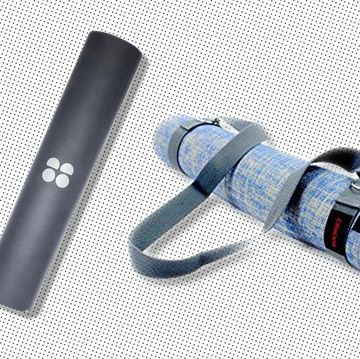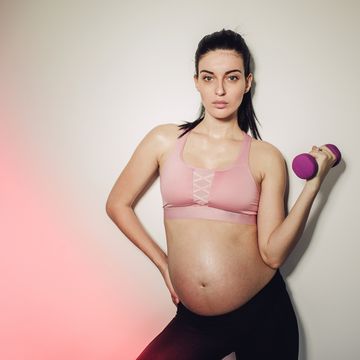Just because a girl in your office has a cousin whose friend lost 10lb in four days with a diet doesn't mean her esoteric diet will be safe, effective, and sustainable for you. Here to put things in perspective is Charlie Seltzer, M.D., a weight-loss specialist based in the US, to debunk the internet's craziest diets and rate them from 1 (try it!) to 10 (totally nuts).
1. Juice Cleanse
Rules: No solids. Some programmes entail drinking six or so ready-to-drink fruit and vegetable juices throughout the day. There are lots of DIY iterations: Victoria's Secret angel Adriana Lima has said she sticks to an all-liquid diet before fashion shows. For nine days prior, she drinks protein shakes made from powdered egg and one gallon of water per day.
Rationale: Because this super low-calorie, produce-based diet prohibits all the solid foods you're used to eating, it helps you eat fewer calories without having to navigate tons of complicated rules. This creates a calorie deficit that promotes weight loss.
Reality: "It might sound cool to lose 10lb in three days, but weight you lose on a juice cleanse tends to be water weight from your muscles, not fat," Dr. Seltzer explains. "Afterward, your body won't look much different in the mirror, and you'll gain it all back from just looking at a bagel," he adds.
Crazy Scale: 11/10
2. The Charcoal Cleanse
Rules: You drink juice containing activated charcoal to your regular diet.
Rationale: Your body can't absorb activated charcoal, so it passes through your digestive system untouched. Because it clings to toxins in the body, it removes impurities like pesticides and any unhealthy stuff found in non-organic or processed foods. Advocates say it improves the skin, boosts digestion, and enhances organ functioning.
Reality: "You think you're taking toxins out of your body, but charcoal doesn't pass through your whole body — just through your intestines, where it can bind to nutrients and suck those out," Seltzer explains. "Our bodies are pretty good at processing toxins, and your chances of dying from toxins in food are lower than your risk of dying from being obese. If you want to decrease toxins in your body, don't eat them in the first place by avoiding processed foods," he adds.
Crazy Scale: 12/10
3. Macrobiotic Diet
Rules: Designed to promote optimal health, you eat a vegan, whole-grain-based diet plus some beans and vegetables. Some versions allow fruits, fish, seeds, and nuts (but only once or twice a week) and strong spices are discouraged. So no animal products (including dairy or eggs) or processed foods.
Rationale: Brown rice and other whole grains contain the perfect balance of yin (stimulating) and yang (stagnating), so a diet largely based on these foods is supposed to promote wellbeing and longevity.
Reality: It's not sustainable and can cause some nutritional deficiencies. "Most people can't do it," Dr. Seltzer says. "The stress associated with trying to follow a diet like this can offset the benefits. We're omnivores and supposed to eat meat," he adds.
Crazy Scale: 6/10
4. The Baby Food Diet
Rules: Designed to promote weight loss, this diet entails eating upward of 16 jars of baby food per day instead of regular meals and snacks. You can eat one regular meal every day.
Rationale: It creates a calorie deficit that promotes weight loss, rids the body of toxins, and helps you breaks bad habits, according to Tracey Anderson, who's been credited with creating the programme.
Reality: While baby food is minimally processed (pro!): "It's a gimmick. If you look at people who have healthy bodies, no one will tell you they eat a baby food diet. It's infinitely ridiculous."
Crazy Scale: Infinity/10
5. The Vision Diet
Rules: You eat everything while wearing blue-tinted glasses.
Rationale: Based on the idea that red/yellow-coloured foods are the most palatable (think: meat, French fries, ripe produce, etc.), this diet is designed to make your food look less appetising. In theory, this makes you eat less.
Reality: "It doesn't sound right to me," Dr. Seltzer says. "But if it makes people leaner, there's no downside." Except being seen in blue shades at brunch, lunch, and dinner.
Crazy Scale: 10/10
6. The Shangri-La Diet
Rules: You drink extra-light olive oil or flavourless sugar water between meals.
Rationale: Eating a variety of flavourful foods stimulates hunger and makes you gain weight. If you consume bland foods, you fend off hunger without inducing food cravings, so you end up eating less and losing weight.
Reality: "Not a bad idea," Dr. Seltzer says. "For some people, exposure to a greater variety of food stimulates the appetite. For others, though, eating the same thing every day makes you bored and crave more foods. Success would probably depend on the person. I wouldn't be offended if you tried eating bland foods at meals. But I'd use whey protein instead of olive oil between meals, because it will satisfy your appetite with fewer calories."
Crazy Scale: 3/10
7. The Clip-Your-Nose-While-You-Eat Diet
Rules: Cover your nose so you can't smell while you eat.
Rationale: It blunts your sense of taste, which helps you focus on your actual appetite and stop eating when you're full.
Reality: "Smell does drive appetite and food intake, but you're going to go out to dinner and cover your nose? No normal person will do that in the long run," Dr. Seltzer says.
Crazy Scale: 7/10
8. The Eight-Hour Diet
Rules: You only eat during a daily eight-hour window (i.e., between 9 a.m. and 5 p.m. or 11 a.m. and 7 p.m.)
Rationale: Intermittent fasting appears to moderate the circadian rhythm and ultimately boost metabolism to fend off weight gain, according to human and animal studies. Also, reducing the amount of time you spend eating can help you save up calories so you don't have to deprive yourself when you do get to indulge.
Reality: "There's no evidence that eating breakfast or eating every three hours improves your metabolism, so for people who don't get hungry in the morning, this variation on fasting is actually maintainable," Dr. Seltzer says. "Just don't try it if it makes you hungry — that's not a good way to live and it's not maintainable for you."
Crazy Scale: 1/10
9. Dessert With Breakfast Diet
Rules: Every morning, you eat a breakfast that's high in protein (i.e., about 45 grams, depending on your weight) and high in carbs (i.e., 60 grams) plus dessert, such as chocolate, a doughnut, a cookie, or cake.
Rationale: Extra protein and carbs fend off hunger, and eating treats in the morning can curb your sweet tooth later on.
Reality: "This is based on research, and it's solid," Dr. Seltzer says. Crazy Scale: 1/10
10. The Ice Cream Cleanse
Rules: You eat five pints of special ice cream a day. (The brand-name version costs $199/£130 for three days. Unlike Ben and Jerry's, this diet ice cream is made from coconut cream and honey.)
Rationale: It controls your calories for a deficit that produces weight loss. And you get to eat ice cream all day. (Don't ask questions.)
Reality: "Any calorie deficit will create weight loss — but it can also cause a nutritional deficiency. Still: What do you do when you go out to dinner? You can't eat ice cream for the rest of your life. People are too concerned with getting weight off and not what happens after it comes off," Dr. Seltzer says.
Crazy Scale: 10/10
11. The Ice Diet
Rules: Eat a litre of ice every day to lose weight. (You let it melt in your mouth instead of chewing it.)
Rationale: Melting ice is hard work that burns calories.
Reality: "Mild dehydration blunts fat burning and stimulates hunger, and this would keep you hydrated," Dr. Seltzer says. "But I don't believe the calorie-burning effects from ice would be significant."
Crazy Scale: 8/10. "It's a good idea to drink more fluids, and anything that decreases your appetite is a good idea. But a litre of ice every day? Come on," Dr. Seltzer says.
12. Gluten-Free Diet (for Weight Loss)
Rules: No gluten-containing foods, which includes anything made with wheat, barley, or rye (such as breads, most baked goods, and many snack foods).
Rationale: When you avoid gluten, there is less you can eat overall, so you end up consuming fewer calories by default. Some experts say wheat contains an appetite-stimulating compound that encourages your body to produce insulin, which can cause you to store fat.
Reality: "Wheat does promote fat storage, but only when you eat too much of it," Dr. Seltzer explains. "But the problem is that many people who avoid gluten to lose weight end up adding gluten-free processed foods to their diets, which are full of sugar and can have twice as many calories as whatever you were eating before."
Crazy Scale: 10/10
13. Raw Food Diet
Rules: You can only eat uncooked plant-based foods.
Rationale: Foods lose their enzymes and become less nutritious when you cook them. Most raw, edible foods are low in calories and high in water and fibre, so you can fill up for relatively few calories and ultimately lose weight, according to clinical studies.
Reality: "This is very difficult to follow from lifestyle standpoint," Dr. Seltzer says. "You have to dedicate your life to do it. But there are more effective ways to lose fat and be healthy than avoiding everything processed. If you're looking at apple and crisps, eat the apple — unless you want the crisps, in which case, eat the crisps, because if you start with the apple, you'll probably eat those crisps anyway."
Crazy Scale: 5/10
14. Master Cleanse
Rules: You drink salt water each morning; a lime or lemon, maple syrup, cayenne pepper, and water concoction throughout the day; and laxative tea at night.
Rationale: It's an extreme low-calorie diet with ingredients (cayenne) known to speed up metabolism.
Reality: "I'd rather you eat at McDonald's every day than do this," Dr. Seltzer says. "Force-feeding yourself a horrible-tasting cleanse isn't going to work in the long term, which will discourage you and separate you from the reality of what you need to do to lose weight and keep it off."
Crazy Scale: Infinity/10. "Don't do it," he says.
15. The Cookie Diet
Rules: You eat six to nine special 80- to 90-calorie cookies per day. (Brand name varieties contain ingredients like beef protein hydrolysate and wheat bran.)
Rationale: The cookies provide you with essential nutrients, but control your overall intake to create a calorie deficit and subsequent weight loss.
Reality: "Anything that restricts calorie intake will cause weight loss in the short term," Dr. Seltzer says, "but anyone who thinks they are going to lose weight and keep it off by eating nine cookies a day for the rest of their lives is avoiding real problems." That's because when you drastically reduce your calorie intake, your metabolism slows down. When you go back to eating normal foods, you gain the weight right back.
Crazy Scale: 12/10
16. The Prayer Diet
Rules: You pray every day that you'll lose weight.
Rationale: God helps those who can't help themselves.
Reality: "If praying subconsciously enables you to eat less food or make healthier choices, do it," Dr. Seltzer says. "You're not going to do any physical or metabolic damage by praying."
Crazy Scale: 5/10 ("If you're not making any effort to make healthier choices," Dr. Seltzer says.)
17. The "What Would Jesus Eat?" Diet (aka The Maker's Diet or The Bible Diet)
Rules: This 40-day, multi-phase diet permits organic fruits, veggies, grains, fish with fins and scales, and meat and poultry. It prohibits pork products, processed foods, pastas and breads, and grains. In terms of timing, you eat breakfast 12 hours after a light, early dinner.
Rationale: Proponents say that humans are only designed to eat foods created by God, and that reverting back to a diet full of unadulterated foods improves your overall functioning, heightens concentration, enhances your mood, heals pain and inflammation, reduces the risk of cancer, and slows ageing (although there's not much in the way of clinical data to back that up).
Reality: "If you can do it and like it and stick with it, then it's the best nutrition plan you have out there. Everyone should follow an all-organic nutritional plan, but practically, that's very hard," says Dr. Seltzer.
Crazy Scale: 1/10 for effectiveness, 5/10 for practicality
18. The Beverly Hills Diet
Rules: You start your day with one kind of fruit and eat as much of it as you want. Then, you can wait one hour and switch to eating another kind of fruit in unlimited quantities, or wait two hours and progress to other food groups. Then you can combine protein and fat or carbs and fat, but no carbs and protein together. You can't mix fruit with any other foods, and you can't eat any artificial foods. On the plus side: You don't count any calories and you can drink champagne with anything!
Rationale: Because the body stores unburned calories as fat, inefficient digestion is responsible for weight gain, according to some sources. Combining some foods and separating others helps your body fully digest your food. And complicated rules will ultimately make it difficult to mindlessly eat.
Reality: "There's no research that food combining does anything," Dr. Seltzer says. What experts do know: "Ounce-for-ounce, alcohol has more calories than protein or carbohydrates, and it's the only thing that simultaneously provides calories and stokes your appetite," Dr. Seltzer says.
Crazy Scale: 10/10
19. Cabbage Soup Diet
Rules: On this seven-day weight-loss diet, you can eat as much low-calorie cabbage-based soup as you want, plus small amounts of one or two other foods (like fruit or leafy greens in the beginning of the week, or beef and brown rice toward the end of the week).
Rationale: You get the nutrients you need from the veggies in the soup, and the sheer volume of it keeps you full. You get sick of the soup and limited options really quickly, so you end up eating less overall.
Reality: "You may lose weight from eating very few carbs, but you won't address any of your bad habits," Dr. Seltzer says. So when you return to your old diet, you'll miss all the foods you couldn't eat during your cabbage soup cleanse and end up eating larger quantities.
Crazy Scale: 10/10
20. Cotton Ball/Tissue Paper Diet
Rules: You eat up to five cotton balls (or the equivalent amount of tissue paper) dipped in orange juice, lemonade, or a smoothie in one sitting.
Rationale: You fill your stomach without eating enough calories to gain weight. Reality: "That sounds insane to me," Dr. Seltzer says. "I'm not a gastroenterologist, but I can't imagine that's good for the stomach or intestines."
Crazy Scale: 70/10
21. Fist Diet
Rules: At every meal, you fill your plate with the equivalent of one fistful of protein, one fistful of carbs, two fistfuls of vegetables, and three fingers worth of fat.
Rationale: It helps you eyeball food servings and eat a balanced, portion-controlled diet without counting calories.
Reality: "It's a practical, less complicated approach to food, and a good way to eat," Dr. Selzter says.
Crazy Scale: 1/10. "It sounds good for anyone who doesn't like to track food. Try it!" Dr. Selzter says.
Photo above: Getty Images
From the editors of Cosmopolitan.com, written by Elizabeth Narins












